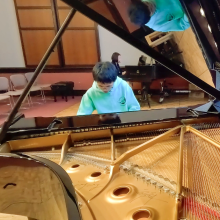The Boston Musical Intelligencer
Deveau Plumbs Schumann's Public Privacy
by David Moran
For the last decades David Deveau has perhaps been better-known as Rockport Music Festival chief, chamber musician, and MIT faculty member, than as a recitalist. On the basis of Saturday night’s performance at the Shalin Liu Performance Center, though, notably for his profound way with Schumann’s Fantasy in C Major, Deveau is well worth seeking out by solo-piano aficionados.
This fantastic and seemingly fragmentary fantasy in three movements, each of them a major architectural and dramatic effort, comprises a sweeping, immensely rich, noble, beautifully voiced set of public private gestures toward Clara, Beethoven, Liszt, and more. Schumann wrote it 1836-’39, in his late 20s, telling his hopeful wife-to-be that the passionate first movement was a lament for her but at the same time prefacing the score with poetic text from Schlegel, describing a tone in the world that speaks “to him who furtively listens in.”
From the opening accented G, Deveau took the piece more deliberately and quietly than one usually hears, with taste, propriety, and gravity. It is fortunately low in those prancing-mice-and-imps abruptions Schumann so favors at the piano, and Deveau did seriously by them anyway, also by the second movement’s many march moments and mood swings. There and elsewhere many pianists gallop, annoyingly, and/or speed up inappropriately; Deveau had no truck with any of that. His rubato was mostly demure. Heard as a whole, the Fantasy is full of the most opulent sounds and chord constructions, especially in the bass. Its stops and restarts are magnificent. Dark colorings make it sound as though it’s in C-sharp. Even for the fanciful styles of the times, everywhere you turn is clever, driving canonic writing, long and short, sometimes punctuated by wee waltzes. More than 40 years ago I heard Brendel play it in Jordan Hall and was flabbergasted, never having before paid it the right (that is, uncallow) quality of attention. Those three long movement arcs are perhaps not so different as they sound, I concluded. I had never heard anything Romantic so sonically moving, so ravishing in intensity, harmonies, and voicings, so shatteringly rich, and so dramatic by means of small signs resulting in large motion and emotion. I still feel it is the best thing Schumann ever wrote, and fortunately find that opinion shared sometimes. Now the work strikes me as something Schubert might have written had he lasted another decade and more: quiet and not so quiet thunder, underlying the most songful melodies, plumbing surprising rhythms and modulations. No wonder Schumann understood and appreciated Schubert as he did.
Deveau’s recital commenced with a Haydn sonata, F major, begun stiffly but ending with comedy. Liszt’s Funerailles sounded more funereal and refined than usual, though little can help Lisztian clatter, and the rendition also to some extent wanted spine. But it must be pointed out that the pianist, no banger, who presents as gentle, will invariably try to find fond and gracious things to emphasize, at the risk of occasional ordinariness. Of Deveau’s new CD featuring the next program entry, Wagner’s Siegfried Idyll in the Josef Rubinstein arrangement, the NY Times’ Anthony Tommasini (himself a capable pianist) wrote that “the sublime, intimate work[’s] harmonic and contrapuntal intricacies come through with beautiful transparency.” True enough and so here in Rockport, although to some ears this idyll idles with noodled repetitions. After intermission, two Brahms miniatures faltered in spots, the Capriccio Op. 76 no. 2 sounding labored and lacking swing, yet the staggered chops of Intermezzo Op. 119 no. 3 did succeed to the extent of setting confidence for the Schumann.
I cannot help going on further about it. The gripping voicings, gripping harmony, mesmerizing bass both chords and lines, entrancing modulations: all were abetted by Deveau’s marvelous pedaling, discrete and discreet. It made for perfect sonic blend and overlap. Schumann occasionally essays late-Beethoven floatiness in the righthand, rising into the ether, but eventually the lefthand bass pulls down the sentiment, grounds it, sets it down calmly and gently. At the conclusion of the work, with the ringing leaps and the decaying of massive chords behind him—the Shalin Liu Steinway sounded unusually luscious the entire evening—the artist, local boy made good now in his early 60s, showed that he had climbed to the peak of the piece and walked down the other side. Graciously, thoughtfully, he shared his experience of the climb, having accumulated the experiences, having learned, having seen the view. Older, wiser, he returned to the plain. Thankfully no further music followed.
David Moran has been an occasional Boston-area music critic for 45 years, with special interest in the keyboard.
READ at Boston Musical Intelligencer





